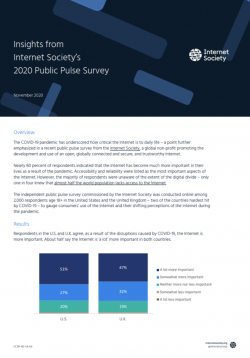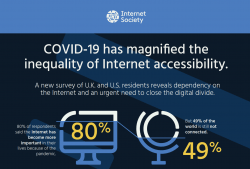Overview
The COVID-19 pandemic has underscored how critical the Internet is to daily life – a point further emphasized in a recent public pulse survey from the Internet Society, a global non-profit promoting the development and use of an open, globally connected, secure, and trustworthy Internet.
Nearly 80 percent of respondents indicated that the Internet has become much more important in their lives as a result of the pandemic. Accessibility and reliability were listed as the most important aspects of the Internet. However, the majority of respondents were unaware of the extent of the digital divide – only one in four knew that almost half the world population lacks access to the Internet.
The independent public pulse survey commissioned by the Internet Society was conducted online among 2,000 respondents age 18+ in the United States and the United Kingdom – two of the countries hardest hit by COVID-19 – to gauge consumers’ use of the Internet and their shifting perceptions of the Internet during the pandemic.
Results
Respondents in the U.S. and U.K. agree, as a result of the disruptions caused by COVID-19, the Internet is more important. About half say the Internet is ‘a lot’ more important in both countries.
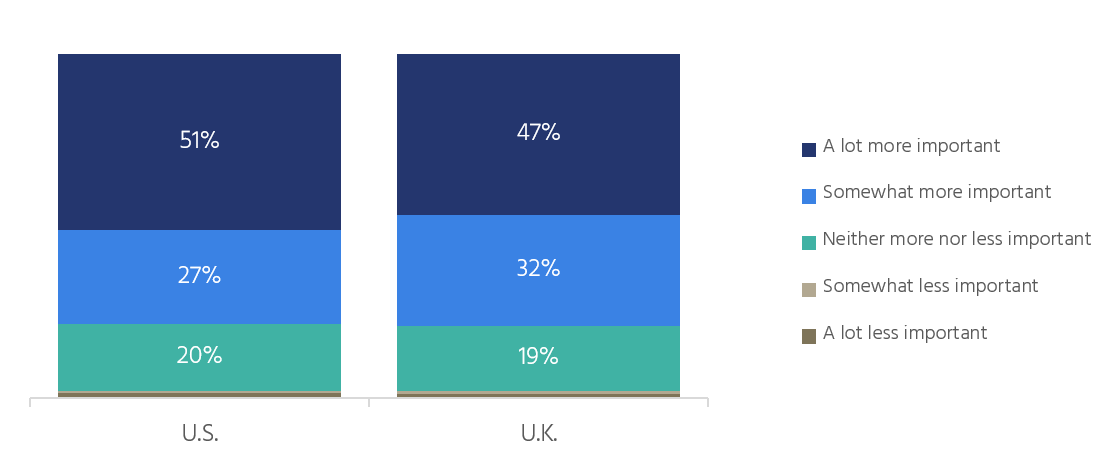
Most respondents in the U.S. and U.K. say they are using the Internet more often to check websites for news, make online purchases, communicate with others, and watch TV or movies.
|
Change in Internet Usage |
U.S. |
||
|
Increased a lot |
Increased somewhat |
A lot + Somewhat |
|
|
Checking websites for news and information |
33% |
33% |
66% |
|
Making purchases online |
31% |
33% |
64% |
|
Communicating with friends & family |
29% |
34% |
63% |
|
Watching TV shows and movies online |
35% |
27% |
62% |
|
Checking websites for health information or telemedicine |
21% |
30% |
51% |
|
Using education and training websites |
22% |
19% |
41% |
|
Working from home |
26% |
13% |
39% |
|
Change in Internet Usage |
U.K. |
||
|
Increased |
Increased somewhat |
A lot + Somewhat |
|
|
Checking websites for news and information |
31% |
37% |
68% |
|
Making purchases online |
22% |
34% |
56% |
|
Communicating with friends & family |
31% |
34% |
65% |
|
Watching TV shows and movies online |
29% |
27% |
56% |
|
Checking websites for health information or telemedicine |
16% |
31% |
47% |
|
Using education and training websites |
16% |
20% |
36% |
|
Working from home |
25% |
14% |
39% |
Sub-group data provides more context.
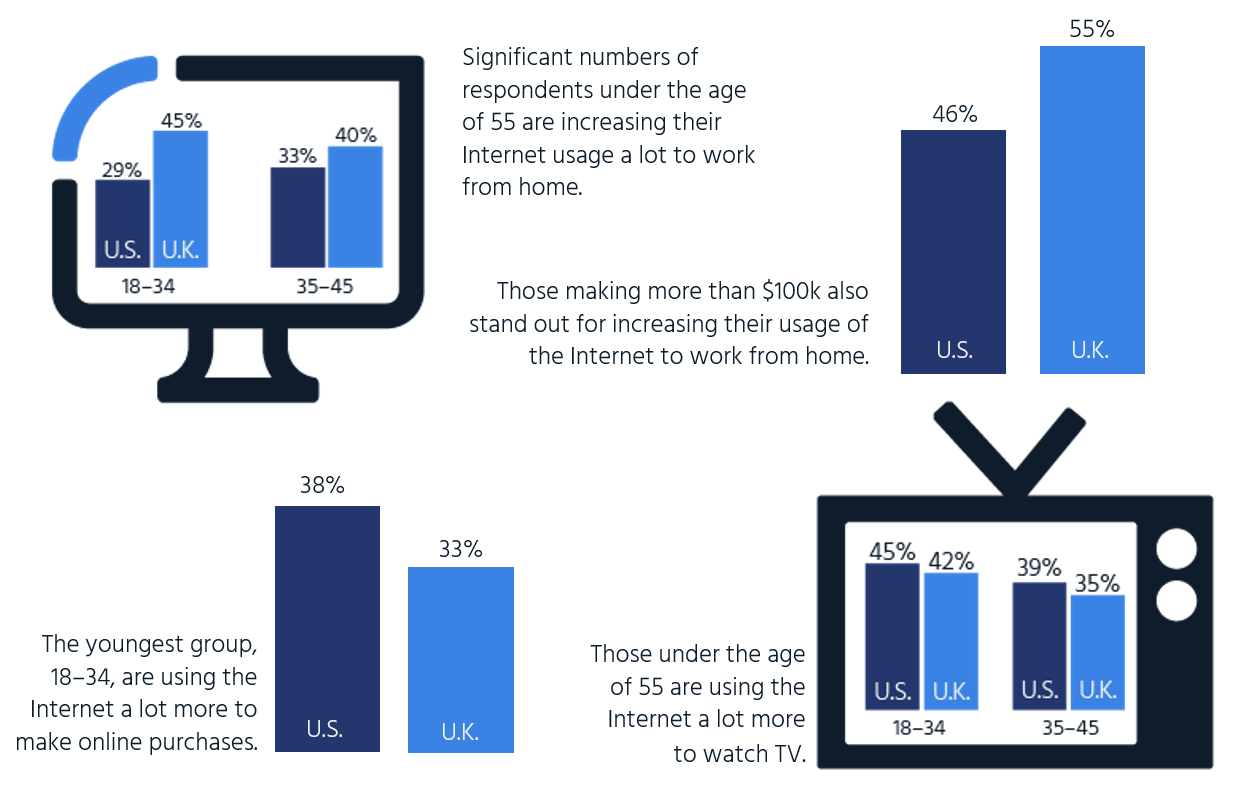
Access and reliability are increasingly important as a result of COVID-19. Over a third say the importance of access and reliability has increased ‘a lot.’
|
Change in Important Aspects of the Internet |
U.S. |
||
|
Increased a lot in importance |
Increased somewhat in importance |
Increased |
|
|
Access |
42% |
26% |
68% |
|
Reliability |
42% |
25% |
67% |
|
Security |
35% |
22% |
57% |
|
Bandwidth |
30% |
26% |
56% |
|
Affordability |
32% |
24% |
56% |
|
Change in Important Aspects of the Internet |
U.K. |
||
|
Increased a lot in importance |
Increased somewhat in importance |
Increased |
|
|
Access |
38% |
28% |
66% |
|
Reliability |
37% |
28% |
65% |
|
Security |
30% |
24% |
54% |
|
Bandwidth |
24% |
23% |
47% |
|
Affordability |
26% |
25% |
51% |
Those aged 18-34 in the U.S. and the U.K. are more likely to say bandwidth and affordability have increased in importance. In the U.K., this same age group is also more likely to say access has increased ‘a lot’ or ‘somewhat’ in importance.
|
Change in Important Aspects of the Internet |
U.S. – by age |
|||
|
% Increased a lot in importance + Increased somewhat in importance |
||||
|
All respondents (n=1,040) |
18-34 (n=309) |
35-54 (n=362) |
55+ (n=368) |
|
|
Access |
68% |
70% |
72% |
59% |
|
Reliability |
67% |
71% |
69% |
60% |
|
Security |
57% |
57% |
61% |
50% |
|
Bandwidth |
56% |
63% |
61% |
39% |
|
Affordability |
56% |
63% |
58% |
43% |
|
Change in Important Aspects of the Internet |
U.K. – by age |
|||
|
% Increased a lot in importance + Increased somewhat in importance |
||||
|
All respondents (n=1,100) |
18-34 (n=340) |
35-54 (n=385) |
55+ (n=375) |
|
|
Access |
66% |
81% |
71% |
51% |
|
Reliability |
65% |
73% |
70% |
53% |
|
Security |
54% |
62% |
59% |
42% |
|
Bandwidth |
47% |
57% |
57% |
29% |
|
Affordability |
51% |
61% |
58% |
36% |
When asked to rank the most important aspects of the Internet, well over half in the U.S. and U.K. ranked reliability as either the first or second most important. Access followed as a close second to reliability with just under half ranking it as either first or second most important.

As the first wave of COVID-19 spread around the world, more than a billion children worldwide were sent home from school in a matter of weeks[1], ostensibly to continue classes online. Yet schools struggled during those first weeks of the pandemic as they confronted the realities of disparate access to technology and connectivity for their students.
However, a majority of respondents in the U.S. and U.K. do not realize what percentage of the world population does not have access to the Internet – only about one in four are aware that less than 50 percent of the world does not have access.
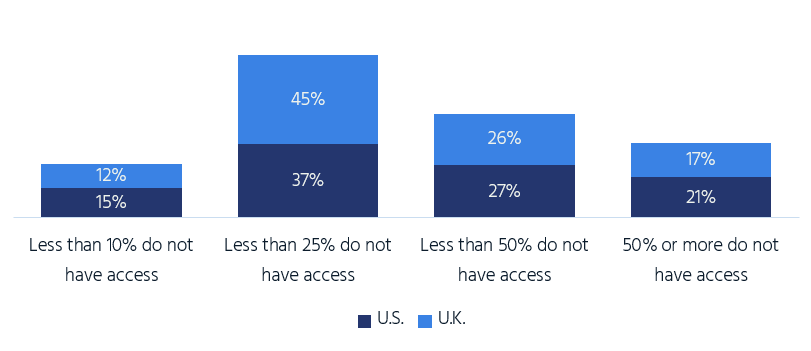
Three-fourths of respondents in the U.S. and the U.K. say the Internet is critical in keeping them connected and that COVID-19 has made access to the Internet critical to their everyday lives. Interestingly, only around a third of respondents say lack of access to the Internet is a serious issue in their community.
|
Agreement with Statements |
U.S. |
||
|
Strongly agree |
Somewhat agree |
Strongly + somewhat agree |
|
|
The Internet is critical in keeping me connected to friends and loved ones |
45% |
30% |
75% |
|
The COVID-19 pandemic has made access to the Internet more critical to my everyday life than ever before |
46% |
28% |
74% |
|
I would not be able to do my job if I had no access to the Internet at home |
37% |
17% |
54% |
|
My children would not be able to continue their education if we did not have access to the Internet at home |
36% |
20% |
56% |
|
Lack of Internet access is a serious issue in my community |
20% |
19% |
39% |
|
Agreement with Statements |
U.K. |
||
|
Strongly agree |
Somewhat agree |
Strongly + somewhat agree |
|
|
The Internet is critical in keeping me connected to friends and loved ones |
43% |
34% |
77% |
|
The COVID-19 pandemic has made access to the Internet more critical to my everyday life than ever before |
39% |
36% |
75% |
|
I would not be able to do my job if I had no access to the Internet at home |
29% |
18% |
47% |
|
My children would not be able to continue their education if we did not have access to the Internet at home |
24% |
19% |
43% |
|
Lack of Internet access is a serious issue in my community |
17% |
17% |
34% |
There is agreement that the onus is on Internet service providers for managing secure and reliable access to the Internet. About half say they are ‘extremely responsible’. Fewer believe non-profits have a major responsibility in managing secure and reliable access to the Internet.
|
Responsibility for secure and reliable Internet Access |
U.S. |
||
|
Extremely responsible |
Very responsible |
Somewhat responsible |
|
|
Internet Service Providers (e.g., Verizon, Virgin Media, AT&T) |
47% |
27% |
13% |
|
Tech companies (e.g., Google, Apple, Microsoft) |
41% |
31% |
15% |
|
Government entities (e.g., U.S., U.K., Korea) |
34% |
23% |
21% |
|
Non-profits with no ties to government, private or public companies |
18% |
23% |
24% |
|
Responsibility for secure and reliable Internet Access |
U.K. |
||
|
Extremely responsible |
Very responsible |
Somewhat responsible |
|
|
Internet Service Providers (e.g., Verizon, Virgin Media, AT&T) |
47% |
29% |
15% |
|
Tech companies (e.g., Google, Apple, Microsoft) |
40% |
31% |
18% |
|
Government entities (e.g., U.S., U.K., Korea) |
34% |
30% |
21% |
|
Non-profits with no ties to government, private or public companies |
16% |
23% |
28% |
An overwhelming majority agree the Internet should remain open and not managed by a single entity. Well over half ‘strongly agree’ with this. Overall, there is no statistical difference between age groups – although those in the U.K. that are 55 + are more likely to ‘strongly agree’.
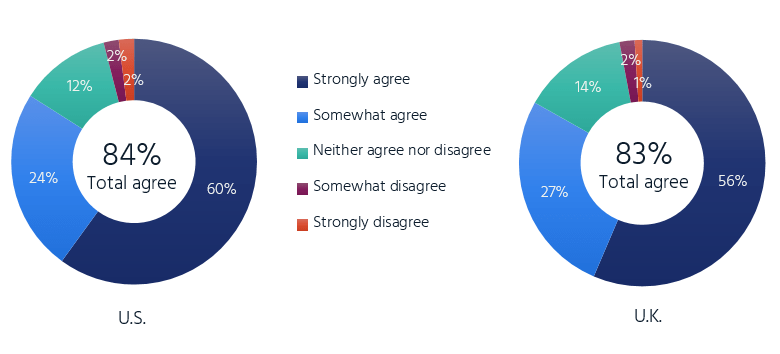
|
Level of Agreement |
U.S. – by age |
|||
|
All respondents (n=1,040) |
18-34 (n=309) |
35-54 (n=362) |
55+ (n=368) |
|
|
Strongly agree |
60% |
58% |
61% |
61% |
|
Somewhat agree |
24% |
26% |
24% |
22% |
|
Total Agree: Strongly + Somewhat agree |
84% |
83% |
85% |
83% |
|
Level of Agreement |
U.K. – by age |
|||
|
All respondents (n=1,100) |
18-34 (n=340) |
35-54 (n=385) |
55+ (n=375) |
|
|
Strongly agree |
57% |
48% |
52% |
70% |
|
Somewhat agree |
27% |
32% |
30% |
20% |
|
Total Agree: Strongly + Somewhat agree |
83% |
79% |
81% |
89% |
When asked to choose which of five technologies respondents would be least likely to give up, the top item in the U.K. was the Internet (36%), followed by mobile phones (22%). Among U.S. respondents, the Internet (28%) and the mobile phone (26%) were a virtual tie.
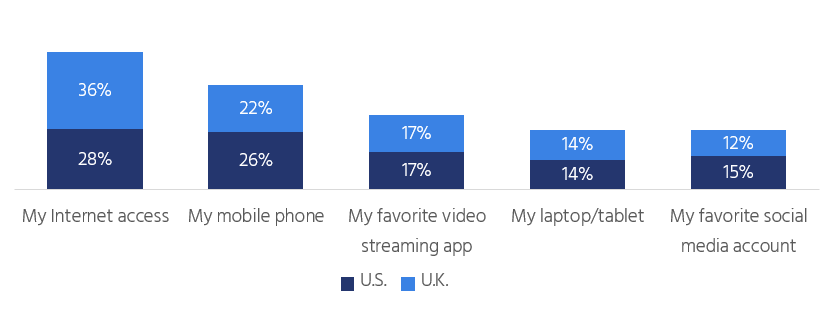
About the Internet Society
Founded in 1992 by Internet pioneers, the Internet Society (ISOC) is a global non-profit organization working to ensure the Internet remains a force for good for everyone. Through its community of members, special interest groups, and 120+ chapters around the world, the organization defends and promotes Internet policies, standards, and protocols that keep the Internet open, globally connected, and secure. For more information, please visit: internetsociety.org.
Endnotes
